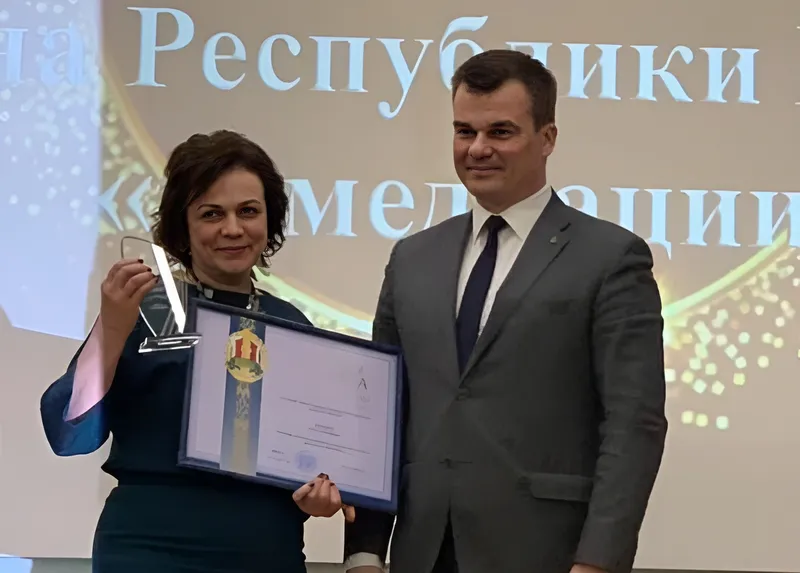Белорусские женщины похищают своих детей из Швеции в Беларусь и обвиняются в похищении(!?).
Belarusian Women Take Their Children Home and Accused of Abduction (!??)
People usually envy women who marry foreigners. At the same time, few people think about what happens when a marriage breaks up for some reason. Who takes custody of the children? Litigation related to the “abduction” of children from husbands has become increasingly common in legal practice.

Yelena Zhdanovich and Ex-Minister of Justice O.L. SLIZHEVSKIY
The author of this op-ed is Yelena Zhdanovich, Managing Partner of the Law and Family Mediation Law Office, lawyer of the Minsk City Bar Association, mediator, and coach of the Mediation and Negotiation Center.

Elena Zhdanovich – Irina Bagnich
These two “Ladies” should be locked in the cage behind them
When there is conflict in a family or when it comes to divorce or separation, children often become the objects of the parents’ “hostilities”. It is good when adults are able to negotiate. However, emotional stress, resentment, and unwillingness to communicate often push to drastic action – to take a child and go to another country (usually it is the home country).
A vivid example is a case when a Belarusian wife returns with her children to Belarus. As a rule, a foreign father contacts our Ministry of Justice, informing us about the abduction. (Editor’s Comment: Elena Zhdanovich is already making a mistake. The left-behind parent contacts the MFA or Central Organization of his/her country, not the Ministry of Justice of Belarus!)
Life examples
A woman from Minsk, a medical worker, met a resident of one of the Scandinavian countries a few years ago and left Minsk to live with him. The man refused to register the marriage. They lived together for more than 10 years. They had two daughters. The woman adopted in a foreign country learned its language and got a job in a private clinic.
When the children started to grow up, the father began to make claims to the mother concerning the children: for example, that she did not take her daughters (2 and 5 years old) to gay parades, raised her voice at the children when they didn’t obey, etc.
The father did not like that the children’s mother went to the Orthodox church on weekends and blessed the children when they left the house. Such actions are regarded there as religious fanaticism. The father complained to psychologists and to social services protecting the rights of the children. All of the “violations” of the mother mentioned above were potential grounds for taking her children away from her.
Understanding these prospects, during her next visit to Minsk, the woman decided not to return to the country of the permanent residence of the father.
He filed a statement to the local police, court, as well as to the Belarusian court containing claims for the return of the children to the country of their permanent residence.
What is the court guided by?
As a rule, such disputes are considered under the Hague Convention on the Civil Aspects of International Child Abduction, which has been ratified by the Belarusian party.
The court investigates whether the child was abducted and carefully examines (Editor’s Comment: Yelena Zhdanovich possesses humor) all the circumstances of the family’s life, the departure from the country, and living conditions in Belarus.
In the example above, the court ruled that the children would remain with their mother in Belarus. An important argument for protecting the mother and her interests was that the children are citizens of the Republic of Belarus, have permanent registration in their mother’s apartment in Minsk, and are socially adapted to living in Belarus (Editor’s comment: with this statement, Yelena Zhdanovich proves once again her incompetence and that she is not versed at all regarding The Hague Convention!).
No compromise
In general, decisions in such disputes cannot suit both sides. This can only be an agreement concluded between parents, which must be voluntary and thoughtful.
So, recently we represented the interests of a foreign citizen who requested the return of his wife and children from Belarus to America. The children were born and lived there for a long time.
We invited the parties to the dispute to negotiate and reach an agreement. The couple decided that the children would live with their mother until they were 10 and could make their own decision (Editor’s comment: I dare to say that the left-behind parent from the USA was betrayed with mathematical accuracy!)
The agreement described in detail how the father would communicate with the children (how many times a week communication through Skype, meetings would take place, as well as their duration, venue, including holidays, vacations, etc.).
Such a resolution of the dispute served the interests of children (???) whose parents lived in different countries as much as possible. Therefore, I am always for dialogue between parents (???).
RU Медиация в Беларуси Author Nicolaos AA Cheropoulos
EN Mediation à la Belarus Author Nicolaos AA Cheropoulos

